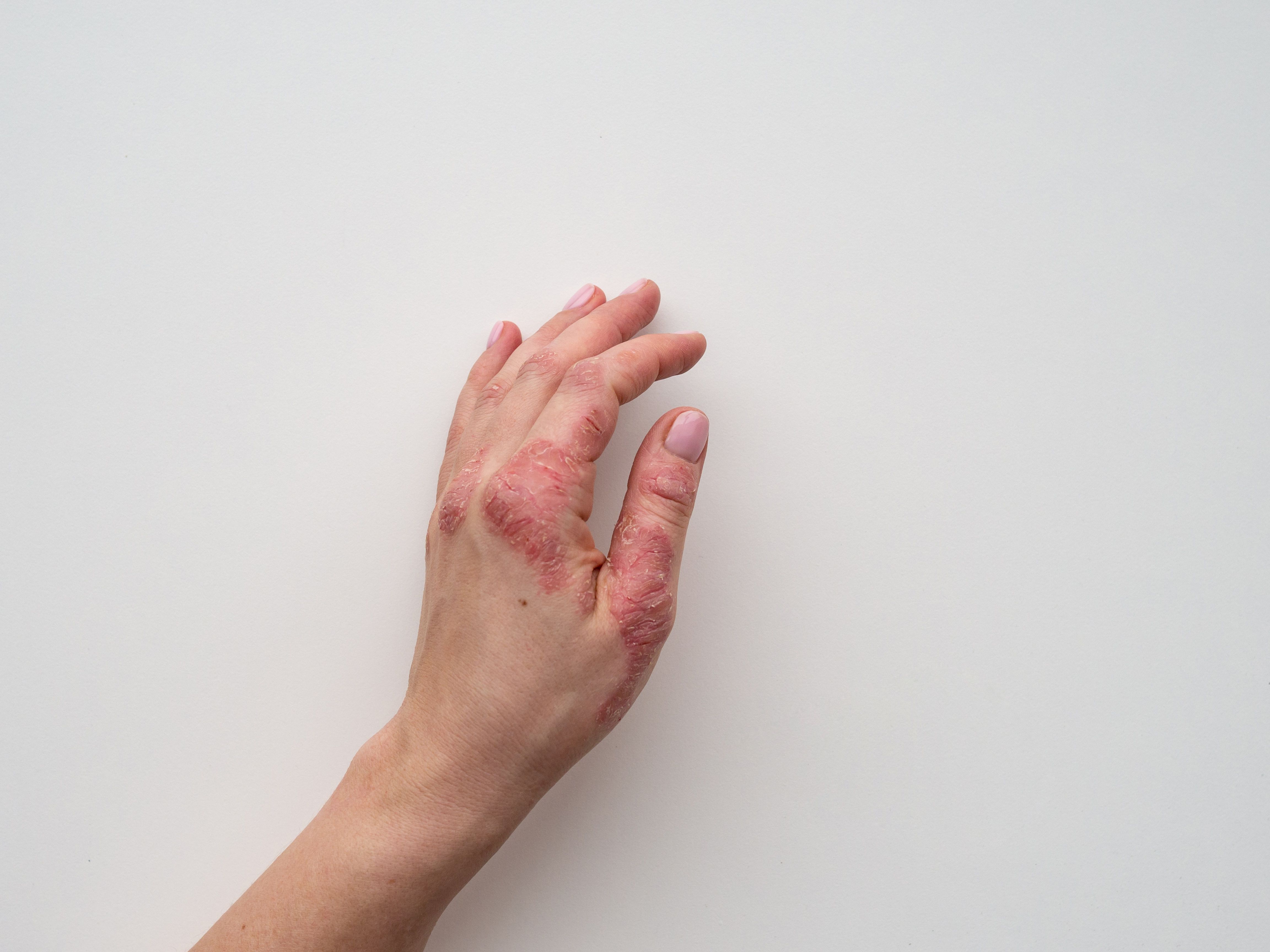- Center on Health Equity & Access
- Clinical
- Health Care Cost
- Health Care Delivery
- Insurance
- Policy
- Technology
- Value-Based Care
Chronic Hand Eczema Has Significant Impacts on Patients' Lives, Survey Reveals
Dermatology providers reported strong impacts on the work and home life of patients with moderate to severe chronic hand eczema, a manifestation of atopic dermatitis.
Dermatology providers reported strong impacts on the work and home life of patients with moderate to severe chronic hand eczema, a manifestation of atopic dermatitis. | Image Credit: IIIRusya - stock.adobe.com

Dermatology providers revealed the significant toll that moderate to severe chronic hand eczema, a form of atopic dermatitis, takes on patients' work, home lives, and emotional well-being, highlighting the substantial burden of this condition, according to a survey conducted by Ipsos that was sponsored by LEO Pharma.1
Chronic hand eczema is a common dermatological condition that presents itself as hand dermatitis which lasts over 3 months or recurs at least twice a year.2 Genetic predispositions, environmental factors, or triggers like irritants and allergens can cause the condition.
The survey included responses from 100 doctors and 92 nurse practitioners or physician assistants in dermatology.1 Dermatology providers (93%) reported they believe atopic dermatitis on the hands impacts their patients’ emotional health, and most of the physicians (92%) also believe the condition impacts ability to perform daily activities, especially typing on a computer.
Atopic dermatitis is one of the most common skin disorders, with a prevalence rate of about 4.7%. When presenting on the hands, patients often experience pain, itching, redness, irritation, thickening, blistering, swelling, and cracking on hands and wrists.
“The toll on their self-confidence and mental well-being can be overwhelming. It is important that we continue to shed light on the complexities of chronic hand eczema, deepen our understanding of this debilitating condition, and ultimately help patients reclaim their lives,” Raj Chovatiya, MD, PhD, MSCI, clinical associate professor, Rosalind Franklin University of Medicine and Science Chicago Medical School and founder and director of the Center for Medical Dermatology, Immunology Research, stated in the release of the survey results.
Based on survey results from providers, patients with chronic hand eczema experienced strong impacts on their family and romantic relationships. Of the health care providers, 72% reported moderate to severe chronic hand eczema impacts the dating life of their patients, and 72% also reported their patients’ relationship with family and friends was impacted. A majority of survey respondents (68%) agreed that chronic hand eczema has impacted their patients’ desire to be intimate in their relationship with a significant other.
Oftentimes, patients experience considerable amounts of discrimination and social isolation with eczema-like skin conditions.3 Patients report a lifetime of struggling with their sense of worth and self-esteem.
Additionally, chronic hand eczema has a negative impact on the US workforce, creating many barriers for patients. Health care providers in the survey (86%) reported patients with chronic hand eczema struggled at work, and 54% said their patients with this condition were impacted financially.1 There were 51% of health care providers who agreed that chronic hand eczema caused patients to stall in their careers.
Dermatological conditions like atopic dermatitis oftentimes create substantial financial burdens, costing over $4 billion annually.4 Both direct costs like physician visits and medications as well as indirect costs like lost work time are considered among the financial burdens.
Atopic dermatitis on the hands also affects patients’ sleep, and 85% of the surveyed health care providers agreed the condition impacts their patients’ ability to sleep.1 There were 92% of health care providers who said chronic atopic dermatitis causes their patients to feel self-conscious.
The FDA does not have any approved topical treatments specifically targeted for chronic hand eczema.5 Currently, oral alitretinoin is the only approved therapy to treat chronic hand eczema. However, LEO Pharma’s DELTA 3 trial (NCT04949841) results confirmed the long-term safety and efficacy of delgocitinib cream (20 mg/g) on chronic hand eczema for up to 52 weeks. The drug demonstrated safe and effective results in adult patients with moderate to severe chronic hand eczema and maintained disease clearance, but researchers suggested real-world evidence to further confirm long-term safety in clinical practice.
References
1. LEO Pharma survey: dermatology providers agree chromic hand eczema impacts patients’ emotional, social and occupational well-being. Press release. LEO Pharma; April 22, 2025. Accessed April 22, 2025.
2. Ghezzi G, Falcidia C, Paolino G, et al. Chronic hand eczema (CHE): a narrative review. Dermatol Ther (Heidelb). 2025;15(4):771-795. doi:10.1007/s13555-025-01365-7
3. Eczema physical and emotional effects. Rady Children’s Hospital – San Diego. Accessed April 21, 2025. https://www.rchsd.org/programs-services/dermatology/eczema-and-inflammatory-skin-disease-center/physical-and-emotional-effects/
4. Santoro C. Addressing financial aid and patient independence as part of atopic dermatitis care. The American Journal of Managed Care®. March 13, 2025. Accessed April 21, 2025. https://www.ajmc.com/view/addressing-financial-aid-and-patient-independence-as-part-of-atopic-dermatitis-care
5. Bosslett M. DELTA 3 showcases long-term safety and efficacy of delgocitinib for chronic hand eczema. Dermatology Times®. March 24, 2025. Accessed April 21, 2025. https://www.dermatologytimes.com/view/delta-3-showcases-long-term-safety-and-efficacy-of-delgocitinib-for-chronic-hand-eczema
